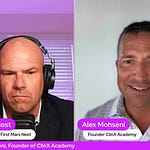Quick Pulses of Full Conversation: Tachyons, Soundbites, Takeaways..
Startups Missing GPO Knowledge
I didn't want to interrupt, but to answer the last part of your last question, having to do with startups. You've done a really good job of bringing this information to startups at a lot of the accelerators you work at. And it kind of blows my mind that we've talked to these startups. They just went through an accelerator. So they got all kinds of help on their company, their product, their value prop, their pitch deck, their everything. And then when that's done, they still haven't heard of a group purchasing organization or know what an idea is
Misconception About GPO Contracts
Well, and I think that that's a really good point, too. And I think, you know, a lot of people think, oh, I'll get a contract with the GPO and then all of a sudden the sales are going to come pouring in. And that's not necessarily what happens.
AI, Radiology, and the Misconception of Sales in MedTech
And then for an example is using AI to augment payments. uh reading you know radiology right right now you know radiologists will see let's say breast scans for instance right and you're seeing such a high volume of them and they have no real their only incentive is to look at that breast scan for what they were looking for there's no incentive for them to look at anything else and there's no real mechanism in most places for them to report hey i found something else right Putting AI over that can do that. And that becomes really important to the payers for various reasons I won't get into. But we're starting to see a lot more direct approach to the payers with products like that. Yeah. This is great. What else would you want people to know about selling in the med tech space? I mean, you've been doing it for 20 some odd years now. You know, I think one thing that you touched on that we didn't really elaborate on is a pilot or an IRB approved study does not necessarily equal sales. And I think that's one really huge misconception that a lot of these companies have is that if I can just get an IRB approved study, you might get a paper published, you might get a great partner out of it, but the people doing that IRB study are not the one making the buying decisions for the hospitals. So what are the kinds of takeaways that I'm hoping the people that are watching this can get? Is there anything else you'd like to talk about before we wrap up today?
Introducing Suzy as Co-Host
Awesome. Well, welcome to Planetary Health First, Mars Next. I am Michael Mann, the host, and I'm really super, super excited today. I have a good friend of mine, Suzy and she's going to be coming on a little more often, a special co-host, guest host, and she's going to be joining me as well at Health. So welcome. She will be doing some cool interviews on the med tech, all things med tech. So, Suzy, we're looking forward to that. And we have one of your colleagues, Stan. So if you want to go ahead and take it away, Suzy. Sure. Yeah. Thank you so much for having me. I really enjoy every episode you put out there. And I'm super excited to interview some people on the med tech side for planetary health. So today, though, it's all about Stan. So Stan, it's lovely to have you here. And I know you very well, but I'm sure a lot of the people watching don't. So can you tell us a little bit about yourself and your background? And then we'll talk a little bit about the topic we're going to jump into today.
The Evolving Role of Payers in Healthcare Networks
And so it's my soapbox, but I think we're making a lot of progress in getting new products through the GPO contract process and then into the hands of caregivers. And they're really making a difference. And it's happening a lot more smoothly and a lot more rapidly than it has in the past. Right. That's great. Yeah, I have a question. This is kind of off. Hopefully it could be helpful to those listening. But GPO, what we've been really talking about is targeting the health systems, the integrated delivery networks. But what about payers? I know this is kind of outside. Is there a GPO sort of orientation to the payers? Not necessarily with the GPOs. They do kind of hold hands with them to a degree when it comes to pharmaceutical contracting and distribution a little more, but where you run into it would be out in the IDN. So many of them now are really locked in partnership with their payers and you're starting to see payers even buying IDNs and it's been somewhat successful. You look at Highmark out in Pennsylvania, You know, if it's done the correct way, it creates a streamlined supply chain. It creates transparency and uniformity from throughout the continuum of care. And that just ultimately results in savings and also, you know, consistent improvement in outcomes. And so you're seeing and then you've also got and it's a good question, Michael, because You know, it's not overt yet, the influence of the payers and health systems, but it's becoming more and more overt. And so, you know, accountable care organizations 10 years ago or whatever that was, and they're still, you know, still out there.
Strategic GPO Leverage for Small Companies
And from there, we're going to go do demos for all of the members of partners cooperative. So. we've taken one small success and, and, and leveraged it within their GPO to get, you know, that attention and visibility, get the contract and without having to go out and put salespeople all over the country, like the, you know, the traditional route doesn't really work anymore. It works for the big companies, the Medtronics and Boston Scientifics, and got hundreds and hundreds of people and feet on the street and, But for smaller suppliers coming along that may have a better mousetrap, they might not have more than 10 people in their company at the moment.
Wrap-Up with Humor and Gratitude
and utilize the tools that the GPOs and even regional purchasing groups are creating for you to optimize once you get the agreement. That's really the key. Stan, you're the man. You're the Michael man. Exactly. This has been awesome. I really appreciate you coming on, Stan, and really helping us, our audience, understand GPOs, what they are, how they can help, really startups as well. And you too, Suzy. Love having you on.
The Risks of Monopolies in the MedTech Market
And that's a good one, Suzy. It happens all the time. We just had it happen with a client. They were in like 30 hospitals and they kept talking about how they got 30 customers. Well, those... people in those hospitals had no conversation or dialogue with the actual, who would be our end user customers. So they're just doing, they're doing research, right? So you have to understand it doesn't mean you can't leverage it. You can certainly. So I think that's a good point. I guess what I would say is. I'm encouraged because my whole career has been bringing new technologies to add friction to categories where I think it's needed. I don't think that we are well served by having any one company control a huge category. And you could look and see what happens when they do that, right? The prices ultimately wind up. Overall, the cost of the hospital often goes up, even though individual prices of products might, you know, be a little lower, they start to bundle and they start to add things and they start to put little caveats on, well, if you stop using that, your price on this will go up. I don't like to see that. And so I am encouraged though, with all the new technology that we've seen with all the startups that we see, I mean…
Stan's Professional Background
And I know you very well, but I'm sure a lot of the people watching don't. So can you tell us a little bit about yourself and your background? And then we'll talk a little bit about the topic we're going to jump into today. Yeah, sure. I'm happy to. Thanks for having me. So, you know, for about the last 20 years, I've been helping suppliers in the medical industry to get contracted with group purchasing organizations, regional purchasing collaboratives, health systems. You know, we call them IDNs or integrated delivery networks. And helping them to get contracted there and then helping them to create the teams and the sales structure and the clinical structure that they need to optimize those agreements. And really that's, you know, I've essentially acted as an outsourced national accounts director for all that time. And that's what we continue to do.
Optimizing GPO Agreements Strategically
That's a good question. And it really comes down to understanding the footprint of the GPO. And so, and they've, all three of the GPOs have done a better job in the last year or two of creating and offering tools and working more closely together with their supplier partners so that you understand what you need to do when you get out there to optimize your agreement. But, you know, what we do is, And it's based on the resources. You know, we've got clients that as they're starting, they have an amazing product that's going to change things, but they only have the resources to sort of handle one or two or three hospitals rolling out at one time. And so we'll apportion that and we'll be very strategic about that. So, oh, you know, we did a deal recently with Wellstar Health System down in Georgia with one of our clients and it's going swimmingly well. Well, now we're at a point where we're just about to release the press release and we're going to and then we go to their regional GPO partners cooperative and we're getting an agreement there based on the success with one of their health systems. And from there, we're going to go do demos for all of the members of partners cooperative. So. we've taken one small success and, and, and leveraged it within their GPO to get, you know, that attention and visibility, get the contract and without having to go out and put salespeople all over the country, like the, you know, the traditional route doesn't really work anymore.
Strategic Pathways for Startups
And so startups can't really wait around for three years. So we help them to find strategic ways to get contracted, even if it's midterm. And what we prefer is an innovative technology, right? So if a startup comes to us and they have something that no one else has, they have something that's differentiated from the perspective of, improving patient outcomes, reducing cost, improving revenue, you know, things that are powerful enough to sort of move the needle. If we can go to Premier or Vizion or Health Trust and make the case that they're differentiated enough and they're unique enough and their results are powerful enough that they need to execute an innovative technology clause, they can get added to national contracts much sooner, much earlier. Now, What we run into a lot with the startups is they haven't dotted all their I's and crossed all their T's quite yet, right? So they may be waiting for FDA regulatory approval. Well, you know, we're not going to sign an agreement with the GPO until you have that. But what we can do is sort of plan it out and we can start having strategic conversations on behalf of suppliers with their member hospitals and IDNs while we're having that dialogue with the GPO so that when the when the FDA approval is done, We don't have to start from scratch. We're ready to go out and start, you know, and engage in that sales dialogue.
Find us & follow us:
😍 💕 🌍 💜 😊 🚀Most important thing is to subscribe to keep updated with our latest podcasts, newsletters...etc.
Planetary Health First Mars Next is a reader-supported publication. To receive new posts and support my work, consider becoming a free or paid subscriber.
We might just lift off to Mars if the orbit is right! 😍 💕 🌍 💜 😊 🚀
In love & kindness,
Michael Mann, (😍 💕)
Disclaimer: the views of the participants are their own only and do not reflect the views of other participants, participants' organizations, etc or Planetary Health First Mars Next or the Host…….
This podcast is for informational purposes only and should not be considered professional or medical advice.
In addition if there are any mistakes or facts that need to be corrected please feel free to reach out to us so we can correct any statement.
Understand we are a self published entity and do the best we can.
If you have an idea or have an inspiring topic or know anyone that would be a great guest for our show please reach out to michael@planetaryhealthfirstmarsnext.org










